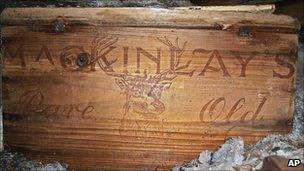Shackleton's South Pole whisky thawing
- Published

The Mackinlay brand is now owned by Scottish distillers Whyte & Mackay
A crate of Scotch whisky that has been frozen in Antarctic ice for more than a century is being thawed by museum officials in New Zealand.
The crate, and four others, were found earlier this year beneath the floor of a hut built by explorer Sir Ernest Shackleton during his 1908 expedition.
Four crates were left in the ice but one labelled Mackinlay's was taken to a museum in Christchurch.
Canterbury Museum officials said it was being thawed in a controlled area.
Lizzie Meek from the museum said: "We've got it sitting there at -8C, and for the next few days between now and Monday we're going to just raise the temperature by a couple of degrees each day until we get to zero.
An Antarctic Heritage Trust team which was restoring the hut found the crates in 2006, but could not immediately dislodge them because they were too deeply embedded in the ice.
Scottish drinks group Whyte & Mackay, which now owns the Mackinlay's brand, launched the bid to recover the whisky for samples to test and potentially use to relaunch the now defunct Scotch.
Canterbury Museum official explains how the whisky is being thawed
Nigel Watson, executive director of the New Zealand Antarctic Heritage Trust, said it might be possible to recreate the whisky from the frozen samples.
He said: "It may be that Whyte & Mackay may be able to replicate the original recipe which has been lost, and then people around the world can taste a piece of history."
Watson said the whisky may still be drinkable but would probably not be tasted.
Sir Ernest's expedition ran short of supplies on its long ski trek to the South Pole from the northern Antarctic coast in 1907-1909 and turned back about 160 kilometres (100 miles) short of its goal.
The British explorer's expedition sailed away in 1909 as winter ice formed, leaving behind supplies.
The pole was first reached in 1911 by Norwegian explorer Roald Amundsen.